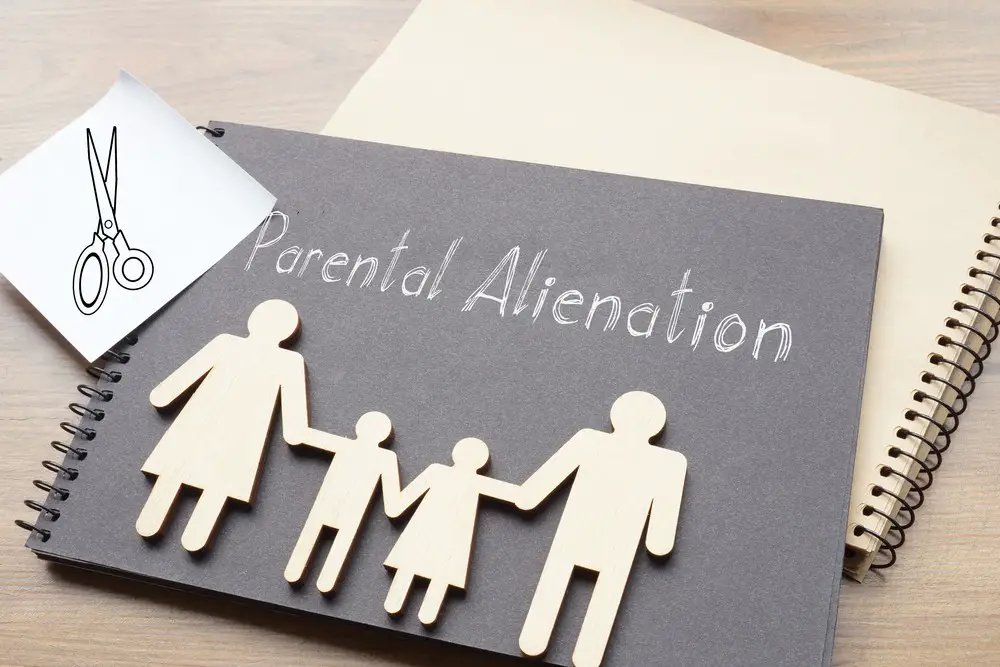As a BetterHelp affiliate, we receive compensation from BetterHelp if you purchase products or services through the links provided
Parental alienation is a heartbreaking and complex issue that can have long-lasting effects on children, even as they grow into adults. This phenomenon occurs when one parent manipulates a child into rejecting the other parent without reasonable justification. Often, parental alienation occurs during high-conflict divorce cases, though it can also happen in other family situations where tension and animosity between parents are present.
As adult children of parental alienation, individuals may experience a range of emotional, psychological, and relational challenges. These experiences can overshadow their ability to form healthy relationships and navigate life independently. Both parents and adult children must recognize the signs and symptoms of parental alienation and understand how to address and overcome this issue for their well-being and relationships with others.
Key Takeaways
- Parental alienation is the process of one parent manipulating a child into rejecting the other parent, often during high-conflict divorces.
- Adult children who have experienced parental alienation may face emotional, psychological, and relational difficulties.
- Recognizing the signs and symptoms and understanding how to address parental alienation is crucial for the well-being and relationships of adult children.
 Understanding Parental Alienation
Understanding Parental Alienation
Concept and Definition
Parental alienation occurs when a child, including adult children, develops a strained or negative relationship with one parent due to manipulation by the other. This can happen when one parent spreads false or exaggerated information about the other, leading the child to reject the targeted parent. This manipulation can result in Parental Alienation Syndrome (PAS) in extreme cases.
Parental Alienation Syndrome (PAS)
PAS is a psychological condition where a child becomes extremely resistant or hostile towards a targeted parent because of the alienating parent’s influence. You might notice the following signs in adult children suffering from PAS:
- Unjustified rejection or hostility towards the targeted parent
- Repetition of the alienating parent’s criticisms about the other parent, often without personal experience
- Lack of guilt or remorse about the mistreatment of the targeted parent
- Refusal to consider the targeted parent’s perspective or feelings.
Some key takeaways for dealing with PAS include:
- Understand that PAS is not officially recognized as a mental disorder in the DSM
- PAS happens when adult children are exposed to prolonged manipulation or brainwashing by the alienating parent
- It can cause significant emotional distress for the involved parties, including adult children, alienating parents and targeted parents.
 Triggers and Causes of Parental Alienation
Triggers and Causes of Parental Alienation
The Role of Divorce
Divorce can be a significant trigger for parental alienation. When parents separate, emotions can run high, leading to unresolved conflicts between the two parties. Consequently, one parent might attempt to establish control by alienating the child from the other parent. The alienated parent, in turn, feels rejected and helpless. Remember, it’s crucial to prioritize the child’s emotional well-being during and after the divorce process.
Anger and Greed
Anger and greed may contribute to parental alienation. A parent who feels wronged during the divorce may channel their hurt or anger into manipulating their child against the other parent. Similarly, greed may drive a parent to alienate the child in hopes of gaining a more advantageous position during custody battles or financial negotiations. Always strive to work through your negative emotions healthily and seek your child’s best interest.
Misinformation and Lies
Misinformation and lies play a significant role in parental alienation. The alienating parent may spread false or misleading information about the targeted parent to the child. They may insist that the other parent is dangerous or unloving, thus damaging the child’s relationship with that parent. To counter misinformation and lies, maintain open lines of communication with your child and provide accurate information that establishes trust and reassures them.
Key Takeaway: Parental alienation can result from a combination of factors, such as divorce, anger, greed, misinformation, and lies. Be mindful of these triggers and work towards protecting your child’s well-being.
Impact on Adult Children
Parental alienation is a serious issue that affects not only the directly involved parents but also the adult children who have experienced it during their childhood. This section will discuss the emotional and psychological consequences on adult children, as well as the effects on their trust and ability to form healthy relationships.
Emotional and Psychological Consequences
Adult children who have experienced parental alienation often face significant emotional pain and mental health issues. They are more prone to psychological consequences such as:
- Anxiety: Constant exposure to manipulation and criticism during their formative years can make adult children more susceptible to different forms of anxiety.
- Depression: Feelings of abandonment and confusion about their relationships with their parents can lead to deep sadness and depression later in life.
- Struggles with identity: Alienated children may have difficulty forming their sense of self and personal identity due to the conflicting messages they receive from their parents.
Key takeaway: The emotional and psychological consequences of parental alienation can be long-lasting and deeply affect adult children’s mental health.
Effects on Trust and Relationships
The impact of parental alienation doesn’t stop at emotional pain and mental health issues; it can also harm adult children’s ability to trust and form healthy relationships. Here are some common effects:
- Distrust: Adult children may develop an inherent distrust of others, particularly in their relationships, due to the manipulation and deceit they experienced in childhood.
- Fear of abandonment: The loss of a healthy bond with one or both parents can create a fear of abandonment that affects adult children’s ability to maintain long-term relationships.
- Difficulty with attachment: The turbulent nature of their childhood relationships can make adult children struggle to form secure emotional attachments with others.
- Poor communication skills: Adult children may have difficulty expressing their feelings and needs clearly, which could lead to misunderstandings and strained relationships.
By understanding parental alienation’s impact on adult children, you’ll be better equipped to support and help those who have experienced it. With proper guidance, understanding, and healing, adult children of parental alienation can work to overcome these challenges and build a healthier and more fulfilling life.
Key takeaway: Adult children of parental alienation can significantly impact trust and healthy relationships, but with awareness and support, they can work to rebuild these essential aspects of their lives.

Recognizing Signs and Symptoms
Anger and Hatred
When adult children suffer from parental alienation, one of the most apparent signs is their anger and hatred towards one parent. The alienated parent often becomes the target of their resentment, even though they may not have done anything to deserve such hostility. It’s essential to recognize this misplaced anger and understand that it may stem from the alienating parent’s manipulation or undermining actions.
- Intense negative emotions towards only one parent
- Rejecting the alienated parent without any valid reason
- Blaming the alienated parent for family issues or past grievances
Self-Esteem Issues
Parental alienation can wreak havoc on an adult child’s self-esteem. With constant exposure to negative remarks and defaming from a parent, it’s hard to maintain a healthy sense of self-worth. These adult children may struggle with guilt and inadequacy, questioning their value and deserving of love and respect.
- Feeling unlovable or unworthy of affection
- Victimizing themselves or constantly seeking reassurance
- Difficulty in making decisions or asserting themselves
Insecure Attachment Style
The relationship between parents and children plays a crucial role in shaping their attachment style when it comes to relationships. Parental alienation can lead to adult children developing an insecure attachment style, which may manifest in various ways in their personal and romantic relationships.
- Fear of rejection or abandonment
- Over-dependency on others for emotional support
- Difficulty establishing trust in relationships
- Struggling to form secure bonds with future partners
Remember, staying observant and empathetic while dealing with adult children of parental alienation is crucial. Help them understand the reasons behind these signs and symptoms, and be supportive as they heal and grow. Offer practical suggestions and professional resources for dealing with these issues. With your understanding and support, they can rebuild their lives and relationships.

Addressing Parental Alienation
Role of Therapy
As an adult child of parental alienation, therapy can be invaluable in your healing journey. A qualified therapist can help you untangle the web of lies and emotional manipulation that the alienating parent has wreaked. In therapy, you will have a safe and supportive space to work through the lasting impact of parental alienation on your mental and emotional well-being.
Here are some ways therapy can help:
- Unveiling distorted perceptions: A therapist can assist in identifying and addressing the lingering after-effects of the alienating parent’s manipulation.
- Establishing healthy boundaries: Therapy can guide you in setting and maintaining clear and appropriate boundaries with the alienating parent.
- Emotional support: Therapists can provide a compassionate ear, helping you navigate the complex feelings of guilt, anger, and betrayal.
Key takeaway: Seeking therapeutic support is essential in addressing the effects of parental alienation and finding your path toward healing.
Reunification Strategies
Reunification with the targeted parent is a delicate and complex process. Here are some strategies that can aid in rebuilding the relationship:
- Open communication: Start an honest conversation with the targeted parent about your experiences, feelings, and the effect of alienation on your relationship.
- Taking it slow: Rebuilding a relationship takes time. Be patient, and allow space for you and the targeted parent to work through your emotions and expectations.
- Setting boundaries: Maintain boundaries with the alienating parent, keeping them separate from your reunification efforts with the targeted parent.
- Acknowledging painful truths: Accept and acknowledge the manipulation’s reality and work with the targeted parent to overcome the lies and distortions.
Remember, the road to reunification may be challenging. Still, with open communication, understanding, and a commitment to healing, you can successfully address the consequences of parental alienation and move forward together.
Key takeaway: Reunification with the targeted parent is a gradual process that requires open communication, patience, and a genuine commitment to healing past wounds.
 Legal Aspects of Parental Alienation
Legal Aspects of Parental Alienation
Family Court System
When dealing with parental alienation, the family court system plays a crucial role in determining the outcome of cases involving this issue. As you navigate the process, it’s essential to understand how the court operates and the importance of presenting your case effectively.
Here are some aspects to consider:
- Documentation: Maintaining a detailed record of communications and incidents related to the alienation is vital. This includes texts, emails, and phone call recordings. The more evidence you have to back your claims, the better your chances are of demonstrating the alienation taking place in your case.
- Legal representation: Consult an experienced family lawyer specializing in parental alienation cases. This helps ensure your rights are protected and your case is presented in the best way possible.
High-Conflict Divorce
Parental alienation is often a symptom of high-conflict divorce situations. In these cases, tensions escalate, and parents may use strategies to turn the child against the other parent. This can result in the child developing a false belief that the targeted parent is “dangerous” or “unworthy of love.” Consequently, judges in family court face the challenge of determining the best course of action for the involved parties.
Here are some factors to consider in high-conflict divorces:
- Determining abuse: One of the challenges that judges face is determining whether genuine abuse has occurred or if the allegations are part of an alienating parent’s strategy. The presence or absence of evidence supporting the allegations can be crucial for the judge to make an informed decision.
- Parenting plans: Courts typically encourage parents to create cooperation-based plans that foster a healthy relationship between the child and both parents. High-conflict divorce situations can, however, make such arrangements difficult. A more structured and intensive plan may be necessary to ensure the child maintains a healthy relationship with both parents.
Communication and understanding the legal aspects are key to tackling parental alienation. Ensure you’re well-prepared and have the necessary support to help protect your rights and your relationship with your child.
Role of the Alienating Parent
As a victim of parental alienation, it’s important to understand the role of the alienating parent in this harmful process. Alienating parents often use badmouthing, criticizing, instilling fear, and spreading lies to manipulate their children.
The alienating parent usually starts by badmouthing the targeted parent. They might share negative stories or demean the other parent’s character to skew the child’s perspective. This can include undermining the targeted parent’s authority or ridiculing their traits and decisions. Remember, the goal is to weaken the relationship between the child and the targeted parent.
Next, the alienating parent might use criticism as a weapon. They may consistently point out the targeted parent’s faults or exaggerate their mistakes, leading the child to develop a negative view of the targeted parent. This constant critique can make the child feel that their relationship with the targeted parent is not worth investing in or preserving.
Sadly, neglect and abuse often come into play as well. In some cases, the alienating parent may neglect their parental responsibilities or subject the child to emotional or physical abuse to exert control over the child’s feelings and thoughts about the targeted parent.
To further manipulate the child, the alienating parent may also use lies to sow doubt and fear. Fabricating stories, twisting facts, or making false claims about the targeted parent’s intentions can make the child feel anxious and mistrustful of the targeted parent, further distancing them.
It’s crucial to remember that parental alienation is an intentional and harmful act perpetrated by the alienating parent. By recognizing these tactics, you can better understand the reasons behind the alienation and seek help and support to navigate this challenging experience.
Role of the Targeted Parent
As the targeted parent, it’s essential to understand your role in dealing with the aftermath of parental alienation. It can be a challenging journey filled with emotional pain and confusion. However, there are strategies to help regain the connection with your adult children while coping with your own emotions.
One important aspect to consider is acknowledging your feelings, such as depression, anger, and confusion. Embracing your emotions, rather than ignoring them, helps you navigate the healing process. You can write in a journal, confide in someone, or seek professional help.
To combat the misinformation planted in your children’s minds, it’s crucial to maintain truthful and consistent communication. Reach out to them openly and calmly, expressing your side of the story without attacking the alienating parent. Encourage dialogue, answer their questions, and provide evidence when needed.
During these conversations, make sure to:
- Be empathetic: Listen to your children’s thoughts, feelings, and concerns.
- Show love: Reassure them of your unconditional love and care, even if they don’t reciprocate immediately.
- Stay patient: Repairing damaged relationships takes time, so don’t expect instant results.
Finding a support group or connecting with other targeted parents also helps deal with the feelings of isolation and depression that often accompany parental alienation. Sharing your experiences, receiving advice, and learning about others’ journeys can offer valuable insights and practical tips.
Lastly, remember to take care of yourself emotionally, mentally, and physically. Parental alienation can be incredibly draining; thus, self-care is essential to ensure you’re in the best possible shape to rebuild the relationship with your adult children.
In summary, as the targeted parent, focusing on your healing, maintaining open and honest communication with your children, and seeking support from others can greatly assist you in navigating through the challenging journey of parental alienation.
 Parental Alienation and Abuse
Parental Alienation and Abuse
Parental alienation can lead to various types of abuse experienced by adult children. This section will discuss the different forms of abuse and their impact on adult children of parental alienation.
Emotional Neglect
Emotional neglect is a common form of abuse in cases of parental alienation. The alienating parent may withhold the child’s love, support, and attention, causing them to feel emotionally abandoned. This neglect can result in the adult child struggling to form healthy relationships and experiencing difficulties expressing emotions.
Key Takeaway: Emotional neglect can have long-lasting effects on an adult child’s ability to form healthy emotional connections with others.
Substance Abuse
Substance abuse may emerge as a coping mechanism for adult children who have experienced parental alienation. They may turn to alcohol, drugs, or other addictive substances to manage the emotional pain and distress caused by the alienation.
As a result, it is important to recognize the signs of substance abuse and encourage them to seek professional help if needed.
Key Takeaway: Parental alienation can contribute to substance abuse issues, so watch for warning signs and supportive resources.
Domestic and Sexual Abuse
Adult children of parental alienation might also become victims of domestic and sexual abuse. The emotional turmoil and instability caused by the alienation may make them more vulnerable to abusive relationships. Additionally, they may internalize the negative beliefs instilled by the alienating parent and believe they are undeserving of healthy, loving relationships.
If you or someone you know is in this situation, consider contacting a counselor, therapist, or domestic violence support organization to help navigate these difficult experiences.
Key Takeaway: Parental alienation can increase the risk of experiencing domestic and sexual abuse, so be aware of resources and support options available.
Frequently Asked Questions

What are the common signs of parental alienation in adult children?
The common signs of parental alienation in adult children may include, but are not limited to:
- Expressing strong and irrational dislike or hatred for one parent
- Refusing contact or communication with the alienated parent
- Belief in negative, false stories about the alienated parent
- Lack of empathy or understanding towards the alienated parent
- Inability to recall positive memories or experiences with the alienated parent
Key takeaway: Look for a pattern of irrational negative feelings towards one parent and a strong allegiance to the other.
Do alienated children often reconnect with their parents as adults?
While some adult children may reconnect with their alienated parents, it varies case by case. Factors affecting the possibility of reconnection include alienation, individual personality traits, and the passage of time. Therapy, support groups, and a healthy environment can improve the chances of reestablishing a relationship.
Key takeaway: There’s hope for reconciliation, but each situation is unique.
How can one prove parental alienation in court?
Proving parental alienation in court can be difficult, but here are some strategies:
- Present evidence like text messages, emails, or witness statements confirming the alienating behavior
- Use an expert in parental alienation to explain the impact on the child
- Show a pattern of the alienating parent interfering with custody or visitation rights
- Highlight efforts made to maintain a relationship with the child despite the alienation
Key takeaway: Build a strong case with evidence, expert testimonies, and examples of alienating behavior.
What are the stages of parental alienation?
There are typically three stages of parental alienation:
- Mild stage: Some tension between the child and the alienated parent, but the relationship remains somewhat intact.
- Moderate stage: The child begins to align more with the favored parent, and the alienation affects the relationship with the alienated parent negatively.
- Severe stage: The child refuses contact or interaction with the alienated parent and may harbor intensely negative feelings toward them.
Key takeaway: Recognizing the different stages of alienation can help you understand the severity of the situation and plan appropriate actions.
How does narcissism relate to parental alienation syndrome?
Narcissistic parents, who have an inflated sense of self-importance and a need for admiration, may be more prone to engage in parental alienation. They might manipulate the child to ensure their emotional needs are met, even at the expense of their relationship with the other parent.
Key takeaway: Understanding the role of narcissism in parental alienation can help identify potential triggers and treatment strategies.
What resources are available for adult children of parental alienation?
For adult children of parental alienation, there are various resources available:
- Therapists or counselors specializing in parental alienation or trauma
- Local support groups or online forums for adult children of parental alienation
- Books and articles on parental alienation and healing strategies
- Legal guidance to navigate custody and visitation issues (if necessary)
Key takeaway: A combination of emotional support, professional guidance, and self-education can help adult children overcome the effects of parental alienation.
Triumph Over Heartbreak: How Jacob Maslow Navigates the Maze of Parental Alienation and Mental Health
If you’re reading this article about adult children of parental alienation, my story might echo parts of your own. My name is Jacob Maslow, and I’ve felt the agony of watching my kids turn away from me due to my ex’s uncooperative behavior in reunification therapy and her severe narcissistic tendencies. My kids and I maintained a close bond for years after our separation—two households but one family. That is, until about 9 months ago, when that connection was suddenly severed.
The Challenge of Shared Custody
- The court ordered shared custody, but my ex has consistently refused to comply.
- Her narcissism seems to worsen as she ages, particularly as her physical beauty fades, a toxic blend that has escalated her efforts to alienate our children from me.
- Moreover, she’s gone as far as breaking numerous court orders, making legal battles an ongoing struggle.
The Impact on Mental Health
Mental health is a challenge I’m no stranger to. I’ve been in therapy for years and currently use BetterHelp for online counseling. Lexapro helps me manage my symptoms. And when things get tough, which they often do, I take long walks daily to clear my head.
Championing the Cause
- Writing is my form of activism.
- I can reach people in similar situations through articles like this and my legal advice site.
- I focus on the perils of dealing with a narcissistic partner and how to overcome mental health issues.
Remember, no one has to fight these battles alone. Just as I’ve found ways to navigate the complicated maze of mental health and custody battles, so can you. Together, we can turn our collective sorrow into a wellspring of support.
- 3 Ways Wearing a Hat Can Help Lower Your Stress Levels - April 19, 2025
- Breaking the Silence: Why Men’s Mental Health Matters More Than Ever - April 15, 2025
- How to Transform a Home’s Patio Space into a Relaxing Space - March 23, 2025
This site contains affiliate links to products. We will receive a commission for purchases made through these links.


 Understanding Parental Alienation
Understanding Parental Alienation Triggers and Causes of Parental Alienation
Triggers and Causes of Parental Alienation Legal Aspects of Parental Alienation
Legal Aspects of Parental Alienation Parental Alienation and Abuse
Parental Alienation and Abuse
